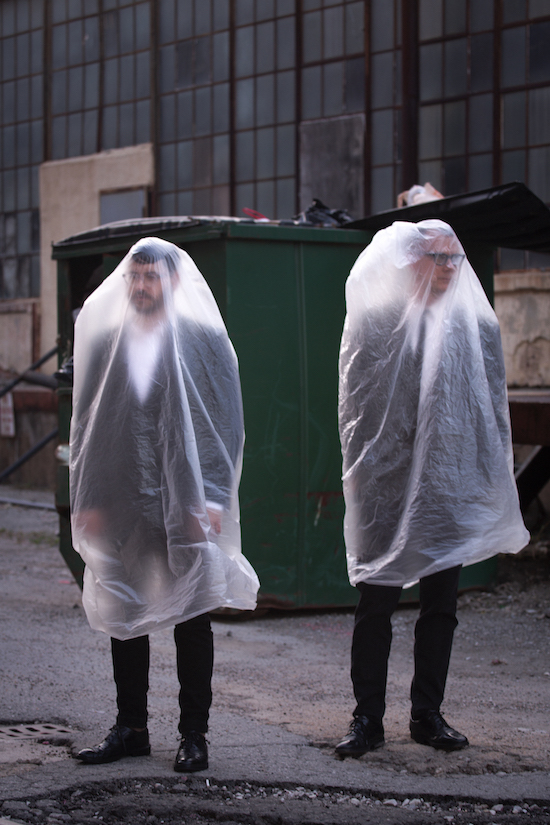Matmos portraits by Theo Anthony
Drew Daniel is much like the latest album he and his partner in Matmos and in life, M. C. Schmidt, have created. Not that Daniel’s a plastic soda bottle that’s been recycled and flattened and shaped into a record, though that’s one version of how their new album Plastic Anniversary is being released. Instead, simply put: he’s bubbly. Energetic, thinking and speaking at a mile a minute, but with deeper waters moving underneath.
"For us," said Daniel in a recent phone conversation regarding the album, "we knew that there was going to be a darker ecological dystopian resonance at times, and we didn’t want to be too on the nose about that. We didn’t want to make a dour, shaming album, sonically. I think having a sprightly pop energy and short, sometimes punchy songs, is a way of allowing the kind of implications of, well, how committed are we to these plastic bottles and these Gatorade bottles and these Tupperware containers? We need them right now. But do we need them 500 years from now?"
Plastic Anniversary, to quote Robert Barry’s review for the Quietus, "squeaks and pops and creaks and slaps, like one of those plastic slapper hand things." Daniel doesn’t do that, at least not in this interview, but given his and Schmidt’s love for sound and constantly mutating live performances, one could imagine it. It’s a hyperactivity that reflects their lives. Daniel chatted after having just finished teaching a class at Johns Hopkins University in Baltimore, while Schmidt was elsewhere for a longer-term commitment: performing in an avant garde opera in Amsterdam.
"Now I have to figure out," Daniel added with a laugh, "how do I wash my own clothes and cook my own meals and not let the house burn down? So it’s a little bit of a confrontation with just how much Martin actually does for me that maybe I ought to be a little more appreciative of."
That sense of the partnership in reflection underscores much of what goes on with Plastic Anniversary, named in part due to their own 25 years of shared work and life. Matmos is as much a state of mind as a state of being, and Daniel and Schmidt have always found expression in various contexts. Their solo efforts are just as remarkable as their joint ones — Daniel continues to release music as the Soft Pink Truth, while Schmidt’s new solo release Aqua Sauvage / Stuffed Concrete, which appeared a couple of months before Plastic Anniversary, is its own striking listen in turn.
Together, though, they continue to challenge themselves, each other, the listeners, all while making you almost laugh with the results – feeling alive, for all that apocalypse always looms, worse by the day. All the while, according to Daniel, time shapes their processes in turn.
"Things can happen in a Matmos song now that I think we definitely weren’t imagining when we were making that first cassette," Daniel reflected, referring to their 1994 self-released debut In Lo-Fidelity. "It was really Martin and I kind of falling in love and just having a laugh cutting up ridiculous sounds. But the core of what we still do is the same. Martin is using an iPad app called Samplr and he’s much more involved in cutting up riffs. In certain ways that brings us closer to the spirit of the first tape.
"We just did a mix for the BBC of all kinds of layers and elements from Matmos songs over the years, and we put in a big chunk of that first tape, and that first tape still speaks to me. I don’t feel ashamed about it or embarrassed about it. I see the technical limitations — it was mono, it was 8-bit. Audio-wise we’ve definitely, I would hope, stepped up our game. But we are those same people."
The concept of plasticity is both specifically present in the songs being created from plastic sample sources and in the wider concept of the term. It’s something which Daniel fully embraces as the academic he is: "In Greek, plastic means ‘having the capacity to be moulded,’ so it connotes a certain awareness of elasticity and of formal possibility. That’s why plastic surgery is about moulding the body. It’s not about plastic as a material. It’s about moulding and shaping. So plasticity starts to connote artificiality, consumer culture, garbage."
While those ultimate negative downsides loom throughout the record – from the frenetic opening ‘Thermoplastic Riot Shield,’ based off such a creation, to the ruminative conclusion ‘Plastisphere’ – Daniel returned to plasticity’s original meaning as potential inspiration, though not always positively.
"I don’t want to redeem plastic necessarily, but plasticity in the sense of allowing one’s self to change, allowing one’s self to be moulded," Daniel considered. "A lot hinges on who’s doing the moulding and in what form. We could say that fanatical, fundamentalist people are stiff in ways that are troubling, and that maybe we need our whole world to be a little more elastic in its attitudes. On the other hand, a lot just hinges on, "What am I being moulded into and who benefits from that?" So I don’t know. To me, interesting art emerges when you feel ambivalent."
On the technical front, Schmidt and Daniel faced a particular problem with the album — namely, the act of recording plastic itself, in whatever form. Daniel initially described the sound of plastic as "a little bit dead," comparing it unfavourably to the more resonant and familiar sonic sources of metal and wood. Asked to elaborate on this point when it came to recording, Daniel emphasised experimentation and surprise, noting one of the most unlikely, on the face of it, sources possible:
"I found that I could get really incredible bass response from sheets of styrofoam. Which is weird, ’cause I think, when you think of styrofoam everybody is like, bowed styrofoam with a violin bow, and it makes that really amazing screaming, squealing, super harsh noise. That’s a cool sound, but you can also, if you hold a sheet of styrofoam up to a good microphone and just strike it with a mallet, you get this incredible ultra-low sub bass. So that was one sonic surprise I guess, was getting real bass out of plastic."

This emphasis on the physical is a recent turn, in the same way that their previous release Ultimate Care II had as its core a washing machine for sound generation. This led to a question about whether these two albums were themselves partially a reaction to the abstraction of 2013’s The Marriage Of True Minds, turning towards easier to summarise ideas. "I think Ultimate Care II definitely was ‘let’s simplify, let’s focus,’" Daniel said in agreement. "Marriage Of True Minds took five years, and it took a long time to even explain, like, what is the process that made this? For conceptual reasons, because each song was grown out of these psychic sessions, the songs were all quite different from each other. But the result was a record that I think is a little bit hard to make it across. I think we felt like we definitely needed to reassert a core commitment to working with objects."
Daniel was also generous with noting the assistance of many others on the record, from the Whitefish Bulldogs, the high school marching band from Whitefish, Montana, where the duo went to record percussive sounds on huge garbage containers, to, to quote him, having "Harry Walker play plastic bass or Brooks Kossover from the band Drugdealer play a plastic flute, or having Greg from Deerhoof play plastic drums." The core duo dynamic remains the centre by default and by intent, and Daniel also underscored that though he and Schmidt trade off "directing" an album — this time around it was Daniel’s turn — his perception is ultimately only part of the story.
His explanation for Plastic Anniversary‘s final elements provided an example: "I ended with poker chips, because to me, poker chips indicate a kind of chance element. That we don’t know our own future. We don’t know what’s coming. It’s not like, oh, you have this momentum and so you’re just a known quantity and you know what’s up and what’s coming. You actually don’t. So there’s a lot of allegories about ourselves in there, but that’s me talking. Martin would be like, well, that’s pretentious bullshit, and I don’t care, and that’s not why we make music. It’s a very Drew point to make," he ended with a chuckle.
That Matmos’s partnership is a personal as well as professional one at its heart is something that defines them thoroughly. In the way that Plastic Anniversary is an accounting of the band’s approach and work to a degree — Daniel freely admits that ‘Silicone Gel Implant’ is a nod to their famed A Chance To Cut Is A Chance To Cure album from 2000 and its own explorations in plastic surgery and other bodily approaches — it also reflects their own lives as they grow older. As Daniel explained, building off a discussion of Chance:
"It’s no secret my father and stepmother are both retired surgeons, and so through them I know surgeons and have access to materials. I think maybe our relation to plastic surgery is pretty different now. You know, Martin’s 54, I’m 47. We’re no spring chickens. We’re definitely tempted to maybe get some work ourselves, so our relation to it has probably changed. I also had some pretty major surgery on my lungs, like a month ago, so my own relation to surgery is different now that I’m middle-aged."
That sense of ageing and time passing was further reflected in a discussion about the concepts of anniversaries, and whether and how Matmos celebrated them in any particular fashion. Turns out they do, but not in the way that most might, thanks to specific timing — for Daniel and Schmidt, their day is none other than Halloween.
"Our anniversary," Daniels noted with amusement, "means that we’ve always got, like, a bag of Halloween candy for kids. Sometimes we have big Halloween parties at our house. We had one once where everybody had to come dressed as what Martin and I were dressed up as on our first Halloween anniversary: he was a priest and I was a cat. Everybody at our Halloween party had to be either a priest or a cat, and it was one of the weirdest parties I’ve ever been to. Like, it was filled with creeps."
The humanity and artificiality and more that compose Matmos has no beginning or end point as such, it ultimately is the flow across boundaries that makes the experience what it is, where a party of priests and cats is as much an element of the story as finding the right way to mike a hunk of styrofoam. Sound and sensation, at the core, is what they provide in such glorious and unsettling ways. It’s perhaps appropriate to end on part of Daniel’s answer to the question on how they pick song titles for pieces that otherwise have no lyrics, especially when they choose not to directly reference anything that shaped a song’s creation. For Daniel, that sense of connection, in the end, is one of trust — that it’s as much something for the listener as for himself and Schmidt as creators:
"For us it’s where the poetics gets to happen, because there isn’t a lot of language in our music. So saying that something is called ‘The Crying Pill,’ it’s literally our nickname for what that object is. Maybe people think that we’re talking about Zoloft or Prozac, and that’s fine if it takes on associations in their mind that maybe weren’t intended. That’s part of losing control of the work and just kind of just letting it go out into the world. You have to trust that people will listen thoughtfully."



